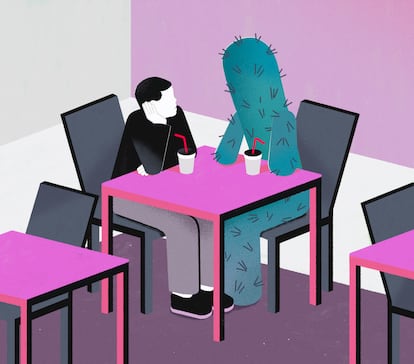Five keys to dealing with difficult people
French psychiatrists Christophe André and François Lelord share some advice for effectively handling complex personalities

One time, chatting with a monk who lived in the city, he told me that there is no reason to admire the mystics who retreat to the mountains or the meditators who are capable of spending long periods in isolation.
“That’s the easiest thing in the world,” he declared, to my surprise. “What is truly difficult is going down into the world and getting along with others. It’s in a subway car full of ill-tempered people where you can measure your level of spirituality.”
Pema Chödrön, a great figure of Buddhism in the United States, spoke in the same vein when she stated that “difficult people are the greatest teachers.” And, certainly, our daily life is usually full of opportunities to interact with these teachers who, to say the least, allow us to practice the art of patience.
Be it at work, in the family or even among our friends, everybody has somebody who is not easy to get along with. How can you keep your cool and gain spiritual points?
In their essay Les Nouvelles Personnalités difficiles (or The New Difficult Personalities) two renowned French psychiatrists, Christophe André and François Lelord, provide specific tips for each profile.
They start from the assumption that it is impossible for everyone to always be relaxed, in a good mood and in tune with other people. Knowing how to relate to others also means learning to live with the most complex aspects of human beings.
Depressive people tend to spread their pessimism to those around them, and paranoid people get offended by any triviality, just to mention two examples. But when can we label them as “difficult”?
The authors explain: “When certain traits of their personality are too predominant, or too consistent, they don’t adapt to situations and entail suffering for a person and their environment. This suffering is a good criterion to diagnose a difficult personality.”
Let’s see how we can deal, in a practical way, with some of the profiles that are often considered difficult.
Borderline. This term is sometimes erroneously used to describe intellectual ability. In truth, it refers to people who are on the edge of mental stability. They are impulsive and have frequent outbursts of anger or dangerous falls into discouragement. How to deal with them: Since they are usually hypersensitive, if they have gone too far we can censor their behavior, the fact itself – but never the person. And it must be done from a place of empathy, explaining how the situation made us feel.
Narcissists. They conjugate life in the first person and demand to be the center of attention. If they don’t succeed, they become rude or try to manipulate others. We cannot expect reciprocity from this type of people. How to deal with them: In addition to praising them when they deserve it, you have to be restrained when you mention your own successes, because they don’t take other people’s achievements well. As far as possible, avoid criticizing them and being late for meetings, as they usually take it as an insult.
Anxious. This is a very common profile that includes people with a tendency to worry excessively and with a desire for control that makes them suffer, especially in times of change or instability. How to deal with them: Although they tend to harm themselves more than others, their fears can be exasperating. Thus, we should not show them ours, so as not to aggravate their problem, and let them know that they can trust us. Humor can help reduce the tension in which they live.
Avoidant. They are so named because they avoid any situation in which they might feel hurt or uncomfortable. Their fear of ridicule makes it hard for them to take the first step. They tend to have self-esteem problems and adopt a low profile, even when they are more qualified than the others. How to deal with them: They need us to listen carefully and let them know that we value their opinion. This will make them feel empowered. Never get annoyed with them or joke about their personality or behavior.
Passive-aggressive. They are especially difficult in the workplace, as they heatedly dispute any order and reject figures of authority. They think they know more about everything and complain about being misunderstood. Any triviality can be taken as a lack of respect. How to deal with them: Kindness is the best way to deal with this type of people, as well as asking for their opinion. They do not accept criticism and arguing with them is useless, as they are not very self-critical.
Difficult does not equal toxic
Spanish psychologist Rafael Santandreu is against labeling anyone as “toxic.” In his opinion, there are no toxic people, but rather relationships that can be described as such. When two people who have nothing in common or who are not good for each other stay together, the bond becomes toxic – but these same people can establish healthy relationships with others, or in different situations.
Cognitive psychology maintains that what is harmful is seeing the world as toxic, setting a barrier between some people and others. What does happen is that we all sometimes behave in a toxic way or are where we should not be, something that can be fixed by becoming aware of it, instead of blaming others.
Francesc Miralles is a writer and journalist who is an expert in psychology.
Tu suscripción se está usando en otro dispositivo
¿Quieres añadir otro usuario a tu suscripción?
Si continúas leyendo en este dispositivo, no se podrá leer en el otro.
FlechaTu suscripción se está usando en otro dispositivo y solo puedes acceder a EL PAÍS desde un dispositivo a la vez.
Si quieres compartir tu cuenta, cambia tu suscripción a la modalidad Premium, así podrás añadir otro usuario. Cada uno accederá con su propia cuenta de email, lo que os permitirá personalizar vuestra experiencia en EL PAÍS.
¿Tienes una suscripción de empresa? Accede aquí para contratar más cuentas.
En el caso de no saber quién está usando tu cuenta, te recomendamos cambiar tu contraseña aquí.
Si decides continuar compartiendo tu cuenta, este mensaje se mostrará en tu dispositivo y en el de la otra persona que está usando tu cuenta de forma indefinida, afectando a tu experiencia de lectura. Puedes consultar aquí los términos y condiciones de la suscripción digital.
More information
Archived In
Últimas noticias
The life of a delivery driver in China: ‘Many people don’t know how an order can arrive at their home in just one day’
Maude Apatow, from acting in ‘Euphoria’ to directing: ‘There are many films that you can tell weren’t written by someone young’
Can cheese protect brain health? This is what the science says
Helen Levitt, the photographer who captured the theater of the everyday
Most viewed
- Christian Louboutin: ‘Young people don’t want to be like their parents. And if their parents wear sneakers, they’re going to look for something else’
- US sanctions against jailed cartel leader ‘El Marro’ highlight Mexico’s lack of control over its prisons
- Cartels in Mexico take a leap forward with narco-drones: ‘It is criminal groups that are leading the innovation race’
- Liset Menéndez de la Prida, neuroscientist: ‘It’s not normal to constantly seek pleasure; it’s important to be bored, to be calm’
- ‘El Limones’ and the growing union disguise of Mexican organized crime










































